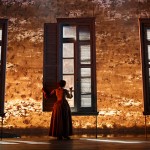Roundabout Theatre
Written by: Helen Edmundson
Based on a novel by Emile
Zola
Directed by Evan Cabnet
Production website 💉💉 out of 5.
This play has appeared on my Theatre History test for the last 25 years. The question reads, “What classic naturalistic novel established the writing career of Emile Zola?” The answer is – – you got it!
I was so anxious to see this almost-never-done play to see if my lectures had any truth to them. To begin, I thought it a bit odd that this production was on Broadway. To me this play just seems to scream Off-Broadway. How in the world did this choice translate to the huge Studio 54 venue? I was more then curious.
Right away, I was confused. I was obviously expecting a naturalistic world – – but instead this play was overtly expressionistic! The setting was stark and poetic. The lights were beautifully moody – – water sparkling over a large built in pool taking half of the stage. I was expecting the “ultra realism” of kitchen sinks and oil lamps. That was not here.
The “naturalism” that I could find in the play dealt with the story only. The story does deal with a licentious affair and the plotting of the cuckold husband’s murder and the ramifications of that overwhelming guilt. It is hard to imagine a time when this kind of plotting would be unthinkable. Sadly, one hardly blinks an eye at this today. But Therese Raquin did indeed serve as the prototype for exploring the psychological damage of adultery. This play was a dirty little story that certainly provided a sharp contrast to all of the boulevard comedies in Paris at the time.
Therese Raquin started on a grim note and ended on a grim note – and everything in between was grim, grim , grim. In fact this play was so grim that I just couldn’t connect with any of the characters. I realize that one tenant of Naturalism is to treat your characters with objectivity, but these characters just stayed on one relentless note for 2 ½ hours.
In the starring role, Keira Knightly, brought all the beauty and charm that she brought to the movies Pride and Prejudice and Pirates of the Caribbean. Her face just radiates. Her eyes truly reflect all of the angst in her world. Her skills as a movie actress certainly paid off for this almost mute role of Therese.
For a tawdry play built on the sexual dalliance – I just couldn’t feel the heat on stage. I can’t imagine they were finding a passion that was worth throwing their lives way. True, they grabbed and rubbed each other with a sort of juvenile crudeness – but passion? I don’t think so.
The stage pictures were beautiful. The lighting and shadows made these characters look like paper dolls set in a 19th century novel. The large pool on stage capable of sailing a row boat was an inspired choice but remained as flat and unstirred as the cast.
This play defined moody – but, naturalistic or not, literary classic or not, the audience was not affected, they didn’t care – they got morose – lots and lots of morose.

